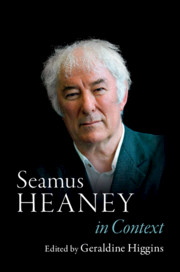Book contents
- Seamus Heaney in Context
- Seamus Heaney in Context
- Copyright page
- Dedication
- Contents
- Contributors
- Acknowledgements
- Abbreviations
- Introduction
- I Mapping
- II Influences and Traditions
- III Poetics
- IV Publishing
- Chapter 15 The Belfast Group
- Chapter 16 In Print
- Chapter 17 Field Day
- Chapter 18 Translation
- V Frameworks
- VI Critical Contexts
- VII Legacy
- Index
Chapter 17 - Field Day
from IV - Publishing
Published online by Cambridge University Press: 15 March 2021
- Seamus Heaney in Context
- Seamus Heaney in Context
- Copyright page
- Dedication
- Contents
- Contributors
- Acknowledgements
- Abbreviations
- Introduction
- I Mapping
- II Influences and Traditions
- III Poetics
- IV Publishing
- Chapter 15 The Belfast Group
- Chapter 16 In Print
- Chapter 17 Field Day
- Chapter 18 Translation
- V Frameworks
- VI Critical Contexts
- VII Legacy
- Index
Summary
Drawing extensively on archival material, this chapter analyses Seamus Heaney’s involvement with the Field Day Theatre Company through the lens of his long friendships with two of the company’s other directors, Brian Friel (who co-founded Field Day in 1980 with actor Stephen Rea) and Seamus Deane. In addition to serving on Field Day’s board of directors, Heaney wrote two works specifically for the company: the verse pamphlet An Open Letter (1983), which protested the use of the adjective 'British' as applied to himself, and The Cure at Troy (1990), a Hiberno-English version of a late play by Sophocles. Heaney’s membership in the Field Day collective gave him a sense of camaraderie, the opportunity to address himself to his country’s urgent needs at a critical point in its history, and the challenge to do things he would not have done otherwise.
- Type
- Chapter
- Information
- Seamus Heaney in Context , pp. 188 - 197Publisher: Cambridge University PressPrint publication year: 2021

